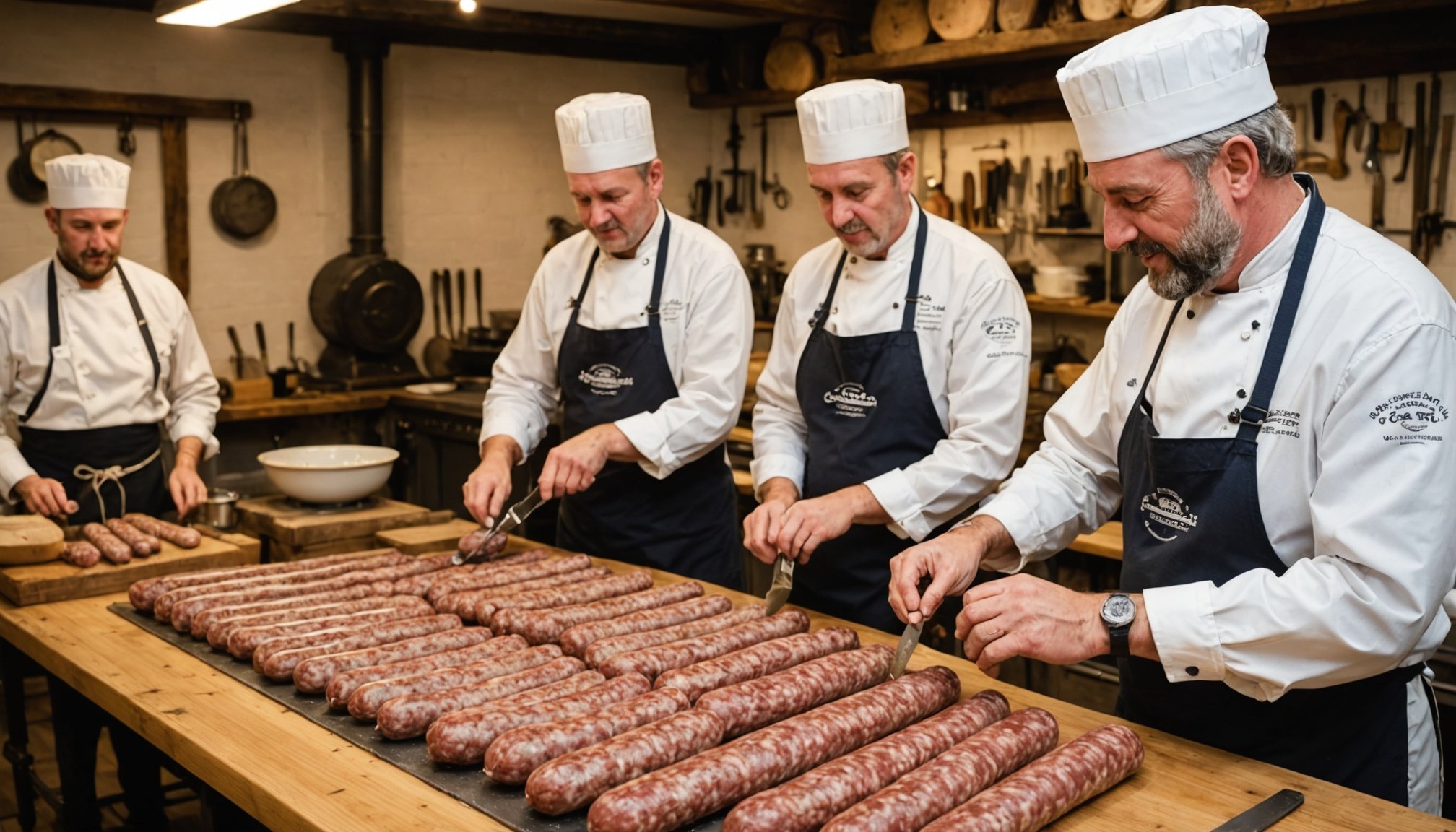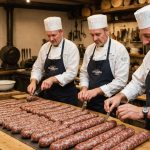Explore the delicious world of traditional British sausage making through engaging workshops tailored for tourists. Uncover the rich history, unique ingredients, and time-honored techniques that define this culinary art. Join hands-on sessions where you can learn from passionate artisans and create your own sausages, leaving with not just skills but unforgettable memories. Whether you're a food enthusiast or simply curious, this guide will help you embark on a flavorful adventure that celebrates the heart of British cuisine.
Overview of Traditional British Sausage Making
Traditional British cuisine is renowned for its delightful sausages, steeped in a rich history that dates back centuries. The art of sausage making is not just a culinary practice but a cultural heritage that has been passed down through generations. Historically, sausages were a means to preserve and make the most of available meat, ensuring nothing went to waste. This practice evolved, and today, sausages hold a cultural significance in British cuisine, celebrated in dishes like the classic "bangers and mash."
Additional reading : Discover Genuine Georgian Cuisine: A Guide to Authentic Dining Experiences in Bath
The importance of sausages in British culinary traditions cannot be overstated. They are a staple at breakfast tables, pub menus, and festive gatherings. Each region boasts its own unique sausage recipes, reflecting local ingredients and flavours. This diversity is a testament to the integral role sausages play in the nation's food culture.
For tourists, sausage making workshops offer a hands-on experience into this traditional craft. Participants learn about the history, ingredients, and techniques involved in crafting authentic British sausages. These workshops not only provide a fun and educational activity but also allow visitors to connect with the cultural essence of Britain through its beloved cuisine.
In the same genre : Discover the Top Charles Dickens Literary Tours in the UK: A Journey Into the Life and Works of the Great Novelist
Popular Sausage Making Workshops for Tourists
Sausage making classes offer tourists an immersive dive into British culinary traditions. Across the UK, several renowned workshops provide unique cooking experiences that blend education with hands-on practice.
One popular destination is the "Sausage HQ" in London, celebrated for its interactive classes that cater to both beginners and seasoned cooks. Here, participants can expect to learn about traditional recipes and techniques in a lively setting. Meanwhile, "Yorkshire Sausage School" is another esteemed option, located in the picturesque countryside, offering a more intimate experience with local ingredients.
These tourist workshops are strategically located for easy access, often near major cities or tourist attractions. This ensures participants can conveniently incorporate the class into their travel itinerary. Pricing typically ranges from £50 to £150, depending on the duration and depth of the class. Most workshops offer flexible scheduling, with sessions available on weekends and weekday evenings to accommodate various travel plans.
In summary, these workshops not only provide a memorable cooking experience but also enrich tourists' understanding of British culture through the art of sausage making.
The Sausage Making Process
Understanding the sausage preparation process involves a series of meticulous steps that ensure the creation of delicious, traditional British sausages. It begins with selecting the finest cuts of meat, typically pork, which are then finely minced. This is followed by the addition of various ingredients like breadcrumbs, herbs, and spices, each contributing to the unique flavour profile of the sausages.
The next step in crafting sausages is mixing these ingredients thoroughly to achieve a uniform texture. This mixture is then carefully encased in natural casings, traditionally made from animal intestines, which give sausages their iconic shape and texture. This process requires skillful handling to ensure the casing is neither too tight nor too loose.
Different cooking techniques are employed to bring out the best in sausages. They can be grilled, fried, or baked, each method imparting a distinct taste and texture. Grilling offers a smoky flavour, while frying provides a crispy exterior. Baking is a healthier alternative, allowing the sausages to cook evenly. Mastering these techniques is essential for anyone looking to replicate the authentic taste of British sausages at home.
Types of Sausages Made in Workshops
British sausage varieties are as diverse as they are delicious, with each type offering a unique taste experience. Cumberland sausages, known for their coiled shape and peppery flavour, are a favourite among many. These sausages often feature a blend of herbs and spices, creating a robust and hearty taste. Meanwhile, Lincolnshire sausages are celebrated for their distinctive seasoning, predominantly sage, which gives them a fresh, aromatic profile.
Workshops also delve into specialty sausages that highlight seasonal or regional ingredients. For instance, during autumn, sausages infused with apples or cider become popular, reflecting the bounty of the harvest season. In coastal areas, some sausages even incorporate seafood, offering a unique twist on the traditional recipe.
The influence of local ingredients is paramount in shaping the flavours of these sausages. Regional herbs, spices, and even local brews are often used to create a signature taste that reflects the area's culinary heritage. This emphasis on local produce not only enhances the flavour but also supports local farmers and producers, making each bite a celebration of British agriculture.
Testimonials from Previous Participants
In exploring the world of traditional British sausage making, participant reviews offer invaluable insights into the workshop experiences. Many attendees have shared glowing testimonials, emphasizing the enjoyable and educational nature of these sessions. Participants often highlight the hands-on approach, which allows them to engage deeply with the process, from selecting ingredients to mastering cooking techniques.
One common thread in customer feedback is the appreciation for the skill development these workshops foster. Attendees frequently mention gaining new culinary skills and confidence in sausage crafting, which they can replicate at home. This element of practical learning is a significant draw for many, as it provides not just a memorable experience but also a lasting culinary skill.
While the majority of feedback is overwhelmingly positive, some participants have offered suggestions for improvement. These include expanding the variety of sausages made in class or incorporating more regional recipes to broaden the cultural experience. Others have expressed interest in additional offerings, such as pairing sausages with traditional British sides or exploring more advanced techniques for seasoned cooks. These insights help workshops continuously evolve, ensuring they remain both engaging and educational for future attendees.
Tips for Tourists Participating in Workshops
When embarking on a sausage making workshop, a few strategic preparations can enhance your experience. To begin with, consider the following tourist advice: bring an apron and comfortable shoes. Workshops can get messy, and standing for extended periods is common.
Engaging with instructors and fellow participants is crucial for a rewarding session. Don't hesitate to ask questions or seek clarification on techniques. Instructors are there to guide you, and their workshop tips can offer valuable insights. Interacting with other participants can also enrich your learning; sharing experiences and tips can lead to new friendships and a deeper understanding of the craft.
To prepare for the best experience possible, arrive with an open mind and a willingness to learn. Familiarise yourself with basic sausage recipes or techniques beforehand to get a head start. This preparation for classes will help you feel more confident and make the most of the session. Remember, the goal is not just to craft sausages but to immerse yourself in a cultural experience that is both educational and enjoyable.
Additional Insights into British Culinary Traditions
British culinary heritage is a tapestry of diverse flavours and traditions, deeply rooted in the country's history and geography. British food culture is celebrated for its ability to adapt and incorporate various influences while maintaining a strong connection to local ingredients and customs. This adaptability is evident in the rich array of dishes that make up the local cuisine, each reflecting the unique characteristics of its region.
Sausages, a staple in British food culture, play a significant role in both festive and everyday meals. Whether served at breakfast, as part of a hearty dinner, or during celebratory events, sausages are a beloved component of the British diet. Their versatility and flavour make them a popular choice across the country.
The art of sausage making is intricately linked to regional specialties, with each area boasting its own distinctive recipes. This connection highlights the importance of local cuisine in preserving culinary heritage. Regional variations often incorporate unique ingredients, such as specific herbs or spices, that are native to the area, offering a taste of the local landscape in every bite. This emphasis on local produce not only enriches the flavour but also supports the sustainability of British culinary traditions.
Conclusion and Next Steps for Interested Tourists
For tourists eager to delve deeper into British culinary traditions, future workshops offer a promising avenue. These sessions can be easily found and booked online through dedicated platforms or workshop websites. It's advisable to make reservations well in advance, as these popular classes often fill up quickly.
Once you've secured your spot, consider broadening your culinary journey by exploring additional experiences across the UK. Local cuisine is rich and varied, with each region offering unique flavours and dishes. Attending food festivals or visiting local markets can provide an authentic taste of British culture. These events are excellent opportunities to sample regional specialties and interact with local producers.
For a comprehensive gastronomic adventure, pair your workshop with visits to renowned eateries or traditional pubs. This will enhance your understanding of how sausages and other British staples fit into the broader culinary landscape. Engaging with these experiences not only deepens your appreciation for British food but also supports local communities and their culinary heritage.










